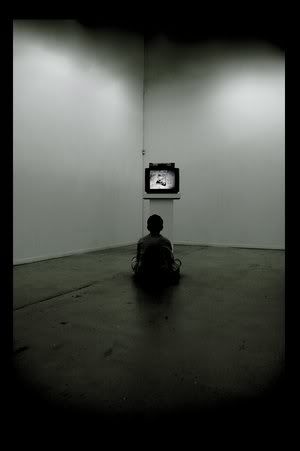how did it come to this?
yes, the marquis' words does sound so true sometimes. art should be given the space to breathe at whatever the cost. art has no morals, no social conventions; art should live for arts' sake. the artist only can provide the key with his works - its up to the indivual mind as to what he does with the piece. literature is, after all, literature. art, is art.
the play really does give off some confusing messages. if the above were true, then wouldnt the play's progression as it had contradict what the marquis has been trying to put forth all the while? all the madness and chaos, ironically at the asylum, all the stirring of the blood by the marquis' controversial, disturbing works...
art does affect the individual. we come to the most fundamental question - how much is too much? is it too much when the subject matter at hand is gory? disturbing? particularly unsettling? then why have it at all? wouldnt the world seem flat if there were only happy art. life is multisided, as with art. should we leave out the bad and write only of the good? wouldnt that be an irony? why is it that a depiction of the horrors of mankind in art considered sick when there are people out there who do horrors of a thousandfold being applauded by it? what makes fiction sick when real life often is... not?
does art affect the individual, cause him to do grievious wrongs like the inmates of the charenton have, or does it bring out the deeper, primal creature in all of us? do we get influenced by our art, or is the art merely a reflection of our inner selves? is it innate in us to plunder and pillage, to hunt and kill, to prey and conquer?
is it wrong to write something u believe in, foolish to suffer for art's sake?
are the words of a raving madman the only truth we can ever hope to hear? it certainly seems so, if the characters in the play are anything to judge by. even the abbe falls - the sole representation of the pure and divine - and falls he does. he is the perfect example of a victim to social and moral restraints; the very restraints he's put himself into causing his ultimate downfall. the marquis however, stands by his ideals, not swayed by reason, not intimidated by rules and convention. he dies the same man he was, tortured in body but not in soul, as have the abbe. then should we see him as a hero?
the director can always choose a way to portray certain events in a way that enlightens her audience as to the message she wants to put forth. and so the phantasy scene of the abbe - what of it? the message that there is no god? that god is the devil in disguise? the necrophilic act that condemns the holy man as a final show of irony? what is the message? what is the director trying to say?
i dont know. i told u im confused by the play. it brings out so many questions i wanna ask and i wanna explode cause there is NOBODY to discuss it with.



